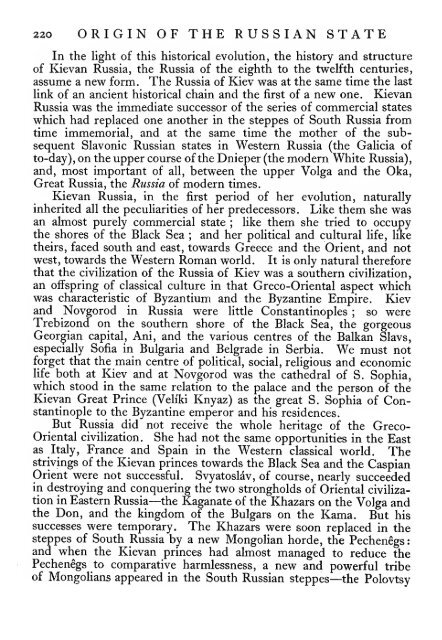Iranians and Greeks in South Russia - Robert Bedrosian's Armenian ...
Iranians and Greeks in South Russia - Robert Bedrosian's Armenian ...
Iranians and Greeks in South Russia - Robert Bedrosian's Armenian ...
You also want an ePaper? Increase the reach of your titles
YUMPU automatically turns print PDFs into web optimized ePapers that Google loves.
220 ORIGIN OF THE RUSSIAN STATE<br />
In the light of this historical evolution, the history <strong>and</strong> structure<br />
of Kievan <strong>Russia</strong>, the <strong>Russia</strong> of the eighth to the twelfth centuries,<br />
assume a new form. The <strong>Russia</strong> of Kiev was at the same time the last<br />
l<strong>in</strong>k of an ancient historical cha<strong>in</strong> <strong>and</strong> the first of a new one, Kievan<br />
<strong>Russia</strong> was the immediate successor of the series of commercial states<br />
which had replaced one another <strong>in</strong> the steppes of <strong>South</strong> <strong>Russia</strong> from<br />
time immemorial, <strong>and</strong> at the same time the mother of the subsequent<br />
Slavonic <strong>Russia</strong>n states <strong>in</strong> Western <strong>Russia</strong> (the Galicia of<br />
to-day), on the upper course of the Dnieper (the modern White <strong>Russia</strong>),<br />
<strong>and</strong>, most important of all, between the upper Volga <strong>and</strong> the Oka,<br />
Great <strong>Russia</strong>, the <strong>Russia</strong> of modern times.<br />
Kievan <strong>Russia</strong>, <strong>in</strong> the first period of her evolution, naturally<br />
<strong>in</strong>herited all the peculiarities of her predecessors. Like them she was<br />
an almost purely commercial state ; like them she tried to occupy<br />
the shores of the Black Sea ; <strong>and</strong> her political <strong>and</strong> cultural life, like<br />
theirs, faced south <strong>and</strong> east, towards Greece <strong>and</strong> the Orient, <strong>and</strong> not<br />
west, towards the Western Roman world. It is only natural therefore<br />
that the civilization of the <strong>Russia</strong> of Kiev was a southern civilization,<br />
an offspr<strong>in</strong>g of classical culture <strong>in</strong> that Greco-Oriental aspect which<br />
was characteristic of Byzantium <strong>and</strong> the Byzant<strong>in</strong>e Empire. Kiev<br />
<strong>and</strong> Novgorod <strong>in</strong> <strong>Russia</strong> were little Constant<strong>in</strong>oples ; so were<br />
Trebizond on the southern shore of the Black Sea, the gorgeous<br />
Georgian capital, Ani, <strong>and</strong> the various centres of the Balkan Slavs,<br />
especially Sofia <strong>in</strong> Bulgaria <strong>and</strong> Belgrade <strong>in</strong> Serbia. We must not<br />
forget that the ma<strong>in</strong> centre of political, social, rehgious <strong>and</strong> economic<br />
life both at Kiev <strong>and</strong> at Novgorod was the cathedral of S. Sophia,<br />
which stood <strong>in</strong> the same relation to the palace <strong>and</strong> the person of the<br />
Kievan Great Pr<strong>in</strong>ce (Veliki Knyaz) as the great S. Sophia of Constant<strong>in</strong>ople<br />
to the Byzant<strong>in</strong>e emperor <strong>and</strong> his residences.<br />
But <strong>Russia</strong> did not receive the whole heritage of the Greco-<br />
Oriental civilization. She had not the same opportunities <strong>in</strong> the East<br />
as Italy, France <strong>and</strong> Spa<strong>in</strong> <strong>in</strong> the Western classical world. The<br />
striv<strong>in</strong>gs of the Kievan pr<strong>in</strong>ces towards the Black Sea <strong>and</strong> the Caspian<br />
Orient were not successful. Svyatoslav, of course, nearly succeeded<br />
<strong>in</strong> destroy<strong>in</strong>g <strong>and</strong> conquer<strong>in</strong>g the two strongholds of Oriental civilization<br />
<strong>in</strong> Eastern <strong>Russia</strong>—the Kaganate of the Khazars on the Volga <strong>and</strong><br />
the Don, <strong>and</strong> the k<strong>in</strong>gdom of the Bulgars on the Kama. But his<br />
successes were temporary. The Khazars were soon replaced <strong>in</strong> the<br />
steppes of <strong>South</strong> <strong>Russia</strong> by a new Mongolian horde, the Pechenegs<br />
<strong>and</strong> when the Kievan pr<strong>in</strong>ces had almost managed to reduce the<br />
Pechenegs to comparative harmlessness, a new <strong>and</strong> powerful tribe<br />
of Mongolians appeared <strong>in</strong> the <strong>South</strong> <strong>Russia</strong>n steppes—the Polovtsy<br />
:

















